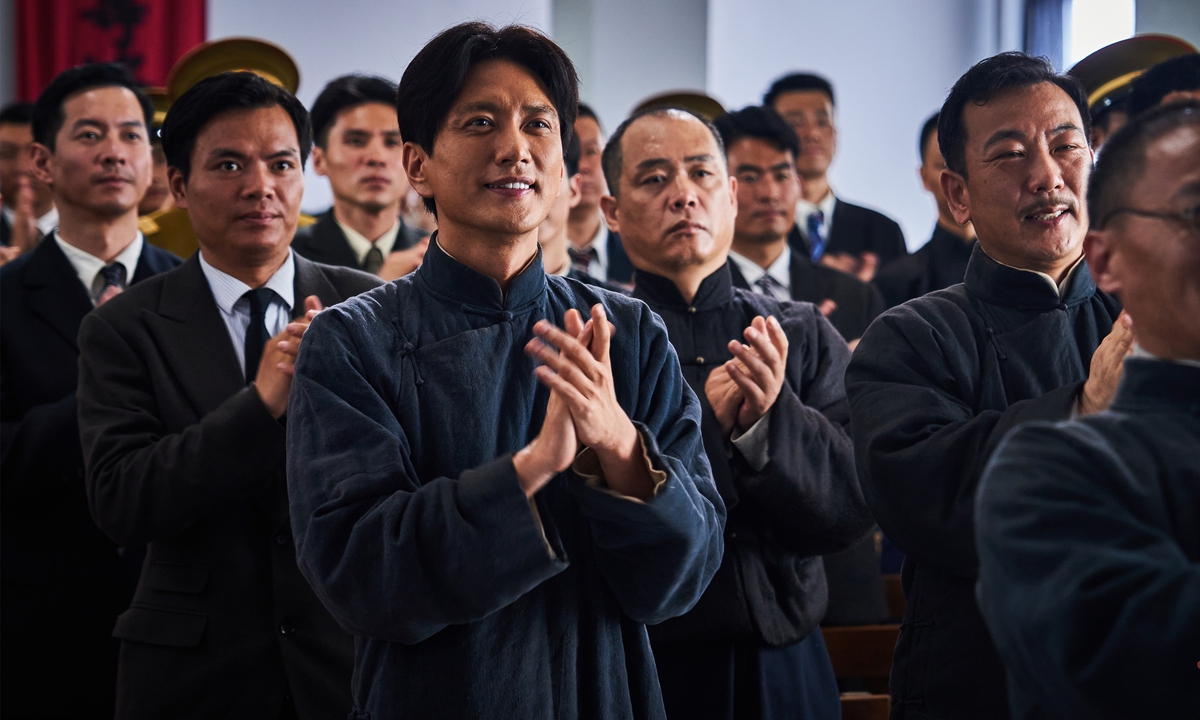
Promotional material for Wondering the Vast Photo: Courtesy of Playing Youth
A number of TV works have been airing to commemorate the 130th anniversary of the birth of late leader Mao Zedong, including Lightseeker: The Story of the Young Mao Zedong and Wondering the Vast. The two key projects from the National Radio and Television Administration have achieved both high viewership numbers and solid word-of-mouth as many Chinese viewers expressed that they strongly resonated with the history on display. The production team told the Global Times that they hope this history could inspire more young Chinese to pursue their dreams.
Lightseeker: The Story of the Young Mao Zedong focuses on a young Mao. The drama narrates his remarkable revolutionary journey from graduating in 1918 from Hunan First Normal School to attending the First National Congress of the Communist Party of China in 1921.
Ma Jihong, screenwriter of the drama, told the Global Times that these three years were a thrilling and transformative period for Mao, a foundational phase during which his worldview underwent a fundamental change. In these three years, Mao transformed from an idealistic youth advocating for education as a means to save the country to a steadfast Marxist.
Director Liu Biao told the Global Times that Lightseeker: The Story of the Young Mao Zedong presents a youth memory about ideals, belief and love. It vividly depicts a group of young people in a moving story about their emotional growth, sacrifices, and dedication to pursuing ideals and love for their country.
After the broadcast of Lightseeker, many netizens expressed that the portrayal of young Mao in the drama made them feel more "amiable" to him. Currently, the related topic on China's X-like Sina Weibo has surpassed 14.47 million views.
Ma said the drama aims to portray a grounded and authentic Mao, breaking him free from the aura of a great leader. The goal is to highlight his interests and emotions as an ordinary person, showcasing the encounters on his path to growth.
"Only through this approach can the audience genuinely feel the personality and charm of Mao as an ordinary person, making the work rich in a sense of the everyday and the warmth of life," she said.
Ma said she was impressed that many post-1990 and post-2000 individuals see Chairman Mao as their idol. They read Mao's works during their daily commute, travel to revolutionary sites like Shaoshan in Central China's Hunan Province and Yan'an in Northwest China's Shaanxi Province, and collect Mao's photos and badges
"Though the era depicted in Lightseeker is a century away from today, the spirit of the young people of that generation - fearlessly facing difficulties, undeterred by setbacks, unafraid of sacrifice - remains timeless. It can still resonate with and inspire today's youths, turning adversity into motivation, allowing them to face challenges head-on and embrace life in the face of death," she said.
The other TV series, Wondering the Vast, tells the story of young Mao Zedong from 1921 to 1927, after returning from the First National Congress of the CPC. Full of deep thoughts on the Chinese revolution and the destiny of the nation, Mao steadfastly practiced Marxist beliefs, evolving from a follower to a pioneer and explorer, ultimately discovering the correct path for the Chinese revolution.
Since the premiere of Wondering the Vast on December 12, the highest viewership rating across all platforms reached 0.78 percent, while the total Sina Weibo topic views have reached 510 million. The audience' response has been enthusiastic, with discussions about the characters gaining traction and contributing to the show's popularity.
In Wondering the Vast, the portrayal of young Mao engaging in activities such as winter swimming, playing soccer and farming adds a humorous and multifaceted dimension to him, reducing the distance between the great figure and the audience.
Liang Zhenhua, the drama's screenwriter, said that the production team began conceptualizing the show in 2021. They systematically organized three field trips starting from December of that year, during which they looked up nearly 100 authoritative historical materials and engaged in multiple discussions with CPC history experts. Filming officially began in May this year.
During filming, 761 scenes were shot and nearly 10,000 costumes and 54,000 props were used. Key meeting venues, major character appearances, and essential office and home environments were faithfully replicated based on historical photographs.
He recalled that the creative team invested considerable effort in meticulous desk work. In Wondering the Vast, the portrayal of 350 historically named figures required in-depth research into their life stories and ideological trajectories before any writing could begin. Every plot point and line of dialogue in the drama underwent careful historical scrutiny, aiming for scholastic rigor. They hope that the TV work can help the audience to have a more comprehensive and in-depth understanding of this period in history.
"Chairman Mao, as one of the earliest organizers and leaders of the CPC, embodied the integration of Marxism with the practical conditions in China. His growth mirrors the glorious development of the CPC. The story of the work unfolds from the transformation of young Mao from an 'early follower' to a 'pioneer' in the Chinese revolution. I hope we have paid tribute to the great leader with an excellent work," he said.





